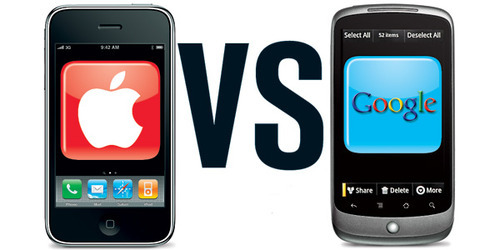Mobile Platform Madness: Apple vs. Google
Mobile Platform Madness: Apple vs. Google

Platform Madness
Over the past year-and-a-half, Reflect7 has been dealing with Apple as our sole mobile platform…and it almost killed us.
Like other developers, we invested hundreds of man hours into a product, only to have it denied after a three week review process. That sort of lag will take the steam out of any engine. Our second denial nearly crippled us. Then, we did something crazy: we communicated to Apple. Our reviewer was very helpful. During the next update, our apps made it to the store without a hitch.
Those stomach pains have been eliminated in the Android App Market. In an open-ecosystem, it’s much nicer. No worries about delays or denials from a cumbersome review process. The App Market is still messy, but Google arrived 6 months late to the app game and 22 months late to the mobile phone OS game.
So where do we anticipate the most revenue? Right now, it’s Apple. We have more apps in their store with some decent exposure. As we convert more of our apps to the Android Market, I see the revenue for both platforms equaling out. I used to think that Apple would dominate. However, as I look back to the beginning of our iPhone apps, I didn’t see near as much traction as I’m seeing on the Android.
Advantage: Apple
The Apple App Store has paid out an outstanding 1B to it’s developers. That’s insane. The Google App Market has paid out around 21-24M. That’s about 2.4% of Apple’s payout. Here’s some of the contributing factors:
- The Apple App Store has about 6x as many paid apps on it (3x as many apps).
- Apple had first mover advantage by 6 months coupled with a superior mass of OS users at launch time
- Google failed to Launch with paid apps and, to this day, still doesn’t have paid apps in several App Market countries.
- Apple had a distribution model and active customers with the already-established iTunes at Launch.
- When comparing payouts, Google app numbers are inflated. A ton of these apps are spam apps that wouldn’t even make it on the Apple App Store.
The first-mover advantage is huge because that gave Apple the ability to lock developers in for an entire development cycle. We ran into this. Why would we allocate resources to develop for a new platform when we’re already busting balls to just get out our next iPhone update? Eventually, we outsourced the job, finished our development cycle, and came back to tweak before releasing.
Less Developers = Less Competition
Our apps will perform well on the Android because there’s an obvious gap in competition and an exponentially increasing user base.
Some have said that Android users don’t buy apps. Supposedly, Apple users spend more per app, buy more apps, and shit skittles. I call bullshit. Apple users aren’t any different than Android users when it comes to their app-purchasing DNA. As stated above, the number of purchase-worthy apps on the Android is significantly less than iOS. Apple also has better search functionality and prefilters quality.
The best way to work against the spam is to position yourself above it. By pricing ourselves higher than everybody else in our field, we’re portraying greater quality. Customers probe deeper by checking our app description and detailed pics. The Android market gives them a 24 hour grace period with every app so users can decide for themselves. The important part here is to attract attention with the initial price positioning.
Conclusion
Customers gravitate towards user experience and developers follow customers. But rather quickly, Google has stepped up it’s game in terms of user-experience (I just got the Samsung Fascinate and it rocks) and OS adoption. It’s open platform policy gives Android a huge number-of-device advantage. That little robot is showing up on all sorts of phones. Despite all of Apple’s initial advantages, the Android OS is narrowing the gap.
The cool thing for us is that developers are still flocking to the iPhone because reports are showing little aggregate revenue for the App Market. They aren’t realizing that a little piece of a huge Apple Pie is the same as a huge piece of a litte Google Pie. For our sake, I hope they keep listening :)
If you liked this you may like:
- 10 things I’ve Learned About The Android Market
- iAds Secret Sauce: How Apple’s Recipe Will Cause a Paradigm Shift
- Are You a Commodity? Foursquare > Facebook Location
-Brian
If you made it this far, you should follow me on Twitter. Follow @jprichardson
-JP